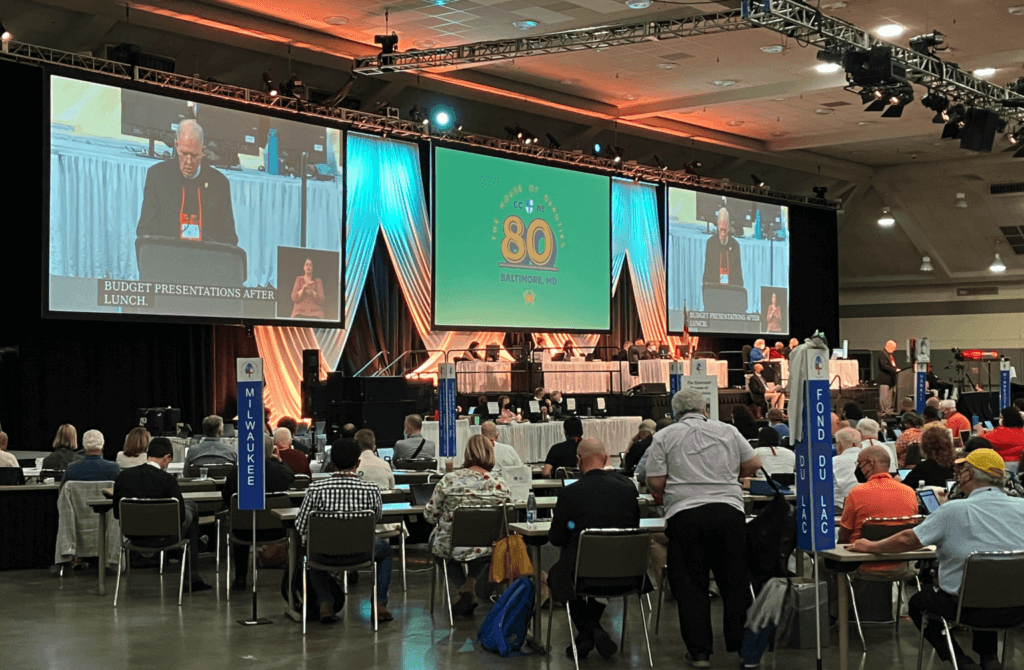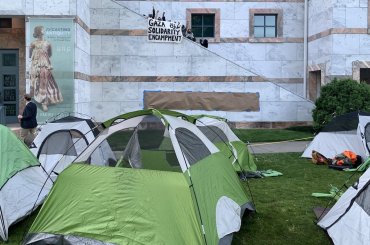After 20 years advocating for Palestinian human rights within our denomination, I am encouraged and happy to see that our General Convention in Baltimore earlier this month my church, the Episcopal Church in the US, passed four resolutions that will empower the church to act on behalf of Palestinians.
Briefly, these call for the following:
In Justice and Peace in the Holy Land – Our Call to Action, Episcopalians “recognize the right of the State of Israel to exist and condemn the continued occupation, segregation and oppression of the Palestinian people; recognizing that for Israel to be a democracy it must allow equality for all its peoples.” The resolution further urges U.S. leaders “to take action to oppose Israeli laws and practices that result in unequal rights for two peoples.”
In a resolution titled Freedom of speech and the right to boycott, the church calls on President Biden and members of Congress to “oppose legislation that punishes supporting nonviolent boycotts and divestments of behalf of Palestinian human rights.”
A third resolution, Conditioning U.S. military aid on human rights, reaffirms the church’s longstanding commitment to “…ensuring that U.S. military assistance and arms sales not be used to perpetuate conflict, violate human rights, or contribute to corruption, instability, or violence.” The resolution also calls on the church’s ministries “to oppose U.S. government military assistance, including the sale or provision of arms and related technologies such as surveillance equipment, to countries that have demonstrated well-documented, persistent, and egregious human rights abuses.”
In a separate action, the church’s House of Bishops approved a resolution registering “alarm at the escalating threat to the Christian presence in the Holy City of Jerusalem and the Holy Land from Israeli radical groups who are actively seeking to undermine the Christian communities of the Holy Land. Addressing concerns expressed by the Patriarchs and Heads of Churches in Jerusalem, the bishops pointed to the “increasing pressure from those who seek to change fundamentally the historic multi-cultural, multi-ethnic, and multi-religious character of the region” and registered their “deep concern for the consequences for the ongoing life of the residents of the Christian Quarter of the Old City of Jerusalem.”
We are not the first mainstream church to take such a stand. In calling for human and equal civil rights for Palestinians, the Episcopal Church joins many other denominations in denouncing Israel’s continuing dispossession and discrimination against the Palestinian people.
Years of work and witness have led to these most recent actions taken by the General Conference. Episcopalians were among the many who traveled to Palestine both to volunteer and return as witnesses to what we experienced. We held conferences in our churches, sponsored film series, wrote plays, submitted letters to editors and placed ads in papers and on billboards to inform and move the hearts of those who do not know about the plight of Palestinians.
In 2010, the Episcopal Peace Fellowship’s Palestine/Israel Network (EPF PIN) was formed to work for a more vibrant response in The Episcopal Church to the rapidly deteriorating situation for Palestinian human rights. The EPF PIN speaks to the church, not for the church, and works with allies like Jewish Voice for Peace, American Friends Service Committee, Sabeel, and U.S. Campaign for Palestinian Rights to offer testimony on behalf of our resolutions at General Convention.
In 1991, the General Convention called for the church to hold in escrow U.S. aid to Israel by an amount equal to funds invested in expansion of settlements in West Bank, Gaza, East Jerusalem. Since then, resolutions have affirmed the “right of return”, declared that Israeli settlements are illegal under international law, upheld the principle of the right of return, condemned the demolition of Palestinian homes in the Occupied Territories as illegal under international law (2003), and in 2006, 2010 and 2014 called on the U.S. government “to press the State of Israel to end the blockade of the Gaza Strip”
In our diocese in Washington, we whittled away, frustrated at the slowness of change and tempted to doubt a tipping point would come. But we were determined to not give up on the move toward justice.
Why has it taken so long? Reasons (not unique to the Episcopal Church) are many: a sense of guilt for the antisemitism practiced by the Church in various times and places; equating the Israel of the Old Testament Bible with the present-day State of Israel; failure to distinguish the unjust Zionism practiced by the State of Israel from theological Judaism which, in fact, requires justice. Another reason is, no doubt, the desire to maintain positive relationships and “open dialogue” between Christians and Jews. Many Americans—Christians and others—are influenced by popular tropes about Arabs being “terrorists” and Jews being “defenseless.” And of course, social considerations often perpetuate the status quo.
But the work of many in the Episcopal Church—and the detailed reports of respected international human rights organizations—has led the church to describe the effects of apartheid without using the word.
Asked to describe what comes next, Linda Gaither, Convener of the Episcopal Peace Fellowship’s Israel-Palestine Network, said, “We know that three resolutions naming the apartheid in Israel have been sent forward for consideration at the 2024 Convention. They will stay firmly on our radar screen… Two years will pass by in a flash and focusing our work is a high priority.”
As an Episcopalian, I am grateful that our church has joined others to call out Israel’s injustice and violation of human rights. In doing so, we take up the challenge to be a church that more fully stands for truth, justice and human rights for Palestinians.
As we say in this long, slow work, “A step closer to the tipping point which will make a difference for Palestine.”



Well done. It’s harder for Christians than for Jews like me. I can’t be accused of being antisemitic. Well, I can be, but I don’t care!
I’m going to forward this to the former (retired) Anglican archbishop of Toronto.